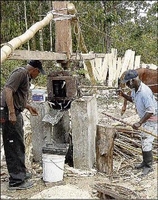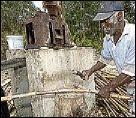Sugar production sweet business
Published: Sunday | February 22, 2009

Zepaniah Brown (left) checks the quality of the sugar-cane juice as Clarence Clarke gets the sugar cane ready to be fed into the mill. - photos by Ian Allen/Staff Photographer
IN THE easy-going rural village in Westmoreland called Lundie, one man, a few of his neighbours and a trusty, old horse name Star Boy are in productive mode.
It is near mid-day and Star Boy has been working all morning, turning the rather crude mill that crushes the sugar cane, to extract the juice from which dark, brown sugar is made.
Zephaniah Brown owns this operation. It is an investment with twin objectives. He earns enough to care for himself and hire a few hands, while indulging in a long-time hobby.
"Sugar is something mi know about. Mi love it. Yes man!" he says with a smile.
Brown and his workers seem not to be too troubled by the growing economic turmoil and the spate of redundancies taking place. They have demonstrated that their project is viable.
The retired 83-year-old Brown is maintaining a tradition and his mode of production is reminiscent of the plantation era when sugar-cane production was done manually.
break even
At the centre of Brown's operation is Lincoln Segree who first beats the sugar cane with a hammer-like implement before feeding it to the mill. Round and round the mill, Star Boy pulls the lever that grinds the cane, and the juice is reluctantly fed into a keg or barrel below.
To increase the power and speed, Segree merely shouts at Star Boy and the old, tired horse trots along the circular path.
The sweet juice with a taste of ginger is sold and, says Brown, "makes a refreshing thirst quencher" or is boiled down to produce wet sugar.
According to Brown, he is much better off doing this than waiting on an uncertain sugar-cane market. With an investment of $500,000, he insists he can break even and make a "good profit" in no time.
The process of making the sugar isn't too hard either. With enough help, one can prepare up to 10 gallons of wet sugar on any day. A quart is sold for as much as $400, though Brown sells his for about $300. In total, up to $22,000 can be fetched in a day's business if one is definitely in the trade to make money.
luxury item
In Lundie, Darliston and surrounding communities, wet sugar is a staple, which means there is always a constant demand for it.
"Them no know dry sugar around here," says Brown. "Round here, dry sugar come like luxury. Is wet sugar we know bout."
Unrefined, wet sugar is packed with far more nutrients than general table sugar and it is far tastier.
It is not too hard getting into the business either. Almost everyone in this district grows cane and with a community so close-knit, materials and workmen can be had at a low cost.
On a normal production day, operating costs are also kept low. Fellow farmers pitch in to assist Brown in exchange for some cane 'liquor', or for some of the golden wet sugar.
It is a thing most farmers here enjoy, and so, often after a long workday, playful quarrel develops over the liquor.
"A who you gi dat?" Clarence Clarke queries as just a mouthful of the refreshing juice is thrown into his calabash by fellow farmer Joseph Campbell.
"You can stay there, you must learn to satisfy. You naa get no more!" exclaims Campbell jokingly.
gareth.manning@gleanerjm.com

Dark, viscose syrup is fed into this trough. It is cooled to produce, wet sugar, which is a sweetener.

This small mill has the capacity to produce more than 10 gallons of wet sugar per day.

Clarence Clarke gathers ripe, freshly cut sugar cane.

















